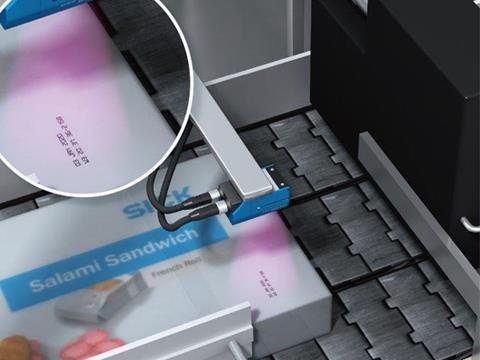
A collaboration between SICK and AutoCoding Systems has resulted in the launch of the 'first fully-automatic smart vision inspection system' for printed coding and marking on food, pharmaceutical and other consumer goods packaging.
According to SICK, the 4Sight Automatic Print Inspection System achieves significant savings in day-to-day production stoppages for producers. An innovation achieved in the AutoCoding 4Sight software, operating on SICK’s Inspector P smart vision camera, enables direct closed-loop communication of the printed message from any brand of printer using standard inkjet, laser or thermal transfer technologies.
The application, one of the first to be developed using SICK’s AppSpace software platform, has delivered an 'error-proof, high-speed inspection system' for printed codes such as dates, batch and line numbers. The new direct communication concept is designed to cut out costly ‘nuisance stops’ and the time-consuming set-up that conventional vision systems need to be taught thousands of images and fonts, as well as the context of the surrounding packaging design affecting the inspection.
“Working with SICK and using the power of the SICK AppSpace development environment, we were able to draw on the strengths of AutoCoding to think about print inspection systems in a completely new way,” explains Mike Hughes, Managing Director of AutoCoding Systems. “The result is a directly networked connection between the printer and the smart camera, coupled with the 4Sight software’s unique ability to self-optimise the code inspection process.”
“As the artificial intelligence is already pre-trained in the application, the AutoCoding system knows exactly the printed message it is looking for. So, the system adjusts automatically when the printer changes to a new job. There’s also much more opportunity to finesse the vision inspection criteria and avoid unnecessary line stops, because there can be no false reads as a result of the packaging background, or due to natural variation in the location of the printed code.”
Powered by SICK AppSpace, onboard the high-resolution SICK Inspector P smart camera with no need for a lineside PC, the 4Sight software simultaneously checks whether the printed code is correct, present and legible.
SICK says users have the flexibility to define what is classed as a ‘good read, bad read or no read’ on a per product basis. However, there will be no need to teach fonts, configure features or regions of interest on the packaging, or for fixturing against an edge or logo.
The 4Sight Automatic Print Inspection System can be set up as a stand-alone system using all main printer brands, as well integrating with proprietary code deployment systems. It can be configured to connect with other devices, for example an encoder, and can be integrated with other systems e.g. to control a rejection system.
The 4Sight system can be set up to provide full diagnostic reports and event logging and will store and forward inspected images to the customer’s network location of choice. Feasibility studies, installation, integration, training and ongoing support are available through AutoCoding Systems.
Neil Sandhu, SICK’s UK Product Manager, Imaging, Measurement, Ranging & Systems added: “All too often we are called in to help production teams who have ended up disabling their vision systems altogether because of the nuisance caused by frequent, unnecessary line stops as a result of an overly-sensitive system.
“The problem is too complex for the operators to fix, so the vision system simply becomes a white elephant. As a result, the manufacturer remains at risk of receiving penalties and damaging their customer relationships if code inspections on delivery result in products being returned.
“That’s why the 4Sight system is such an important breakthrough, because it offers a high-performance, dependable solution that’s easy to set up and use.”













